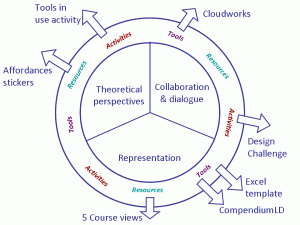For full title of the project is Supporting new models for Curriculum Design and pedagogic understanding by implementing social networking and technology-supported design innovations (Conole, Weller, Cross, White, Brasher and Clark).
Our work is underpinned by an ongoing programme of empirical work, aimed at getting a richer understanding of educational design processes. Data collected includes interviews, surveys, observations, web statistics, focus groups, as well as gathering data at workshops and other events we run. The empirical data informs the three main strands of our work: representing pedagogy, informing the design process and facilitating the sharing and discussing of designs.
In terms of the OULDI research work, we define learning design as:
A methodology for enabling teachers/designers to make more informed decisions in how they go about designing, which is pedagogically informed and makes effective use of appropriate resources and technologies. A key principle is to help make the design process more explicit and shareable. Learning design as an area of research and development includes both gathering empirical evidence to better understand the design process as well as the development of a range of resource, tools and activities.
We see ‘learning design’ as an all encompassing term to cover the process, representation, sharing and evaluation of designs from lower level activities right up to whole curriculum level designs.
We are interested in providing support for the entire design process; from gathering and sketching out initial ideas, through consolidating, producing and using designs, to sharing, reuse and community engagement. These are complex and challenging processes that involve a range of stakeholders with different interests; issues and representations are different depending on whether design occurs at the level of individual activity, course or curriculum. Our vision is of a learning design methodology and suite of practical tools and resources that bridge between good pedagogic practice and effective use of new technologies.
The OULDI project focuses on three aspects of design
1. Collaboration & dialogue – mechanisms to encourage the sharing and discussing of learning and teaching ideas.
2. Representation – identification of different types of design representation and use of a range of tools to help visualise and represent designs.
3. Theoretical perspectives – the development of a body of empirical research and conceptual tools to help guide the design decision-making process and to provide a shared language to enable comparisons to be made between different designs.
